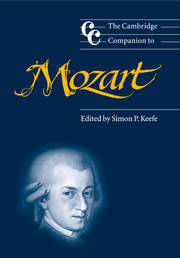Book contents
- Frontmatter
- Introduction
- Part I Mozart in context
- Part II The works
- 5 The keyboard music
- 6 The concertos in aesthetic and stylistic context
- 7 The orchestral music
- 8 Mozart's chamber music
- 9 Mozart as a vocal composer
- 10 The opere buffe
- 11 Mozart and opera seria
- 12 Mozart's German operas
- Part III Reception
- Part IV Performance
- Notes
- Selected further reading
- General index
- Index of Mozart’s works
12 - Mozart's German operas
from Part II - The works
Published online by Cambridge University Press: 28 September 2011
- Frontmatter
- Introduction
- Part I Mozart in context
- Part II The works
- 5 The keyboard music
- 6 The concertos in aesthetic and stylistic context
- 7 The orchestral music
- 8 Mozart's chamber music
- 9 Mozart as a vocal composer
- 10 The opere buffe
- 11 Mozart and opera seria
- 12 Mozart's German operas
- Part III Reception
- Part IV Performance
- Notes
- Selected further reading
- General index
- Index of Mozart’s works
Summary
Mozart wrote German opera throughout his compositional career – from the age of twelve until three months before he died. His career comprised the first flowering of German opera, from its origins as an adaptation of opéra comique (which was in the process of integrating elements of Italian comic opera), with its characteristic alternation of spoken dialogue and music, to its emergence in a distinctly Viennese dialect.
Mozart's two greatest theatrical successes in his lifetime were in fact German operas, Die Entführung aus dem Serail and Die Zauberflöte. Without these two operas the transformation of that provincial adaptation (just one of many at the time) into an exportable commodity might not have occurred. They were essential for the development of an international German repertory, one that became translated rather than one that was the result of translation. While Mozart's German operas were not the only ones that contributed to this development, operas such as Peter Winter's Das unterbrochene Opferfest and Franz Xaver Süssmayr's Der Spiegel von Arkadien (both 1794) would not have enjoyed their international and long-lived success without the precedent established by Mozart. In fact, these operas would probably not have been written in the first place.
Mozart's German operas exemplify the historical development of the genre: both his early and his later works are stylistically consistent in a general way with those of his contemporaries. But Mozart was not a typical late eighteenth-century opera composer. Die Entführung and Die Zauberflöte form only a miniscule part of the contemporary repertory, yet they were works of the highest compositional virtuosity and were performed in virtually every German opera house. The scope of his output in other vocal and instrumental genres, the consistently high quality of his music and the virtuosity of his compositional mastery were unmatched.
- Type
- Chapter
- Information
- The Cambridge Companion to Mozart , pp. 156 - 168Publisher: Cambridge University PressPrint publication year: 2003



